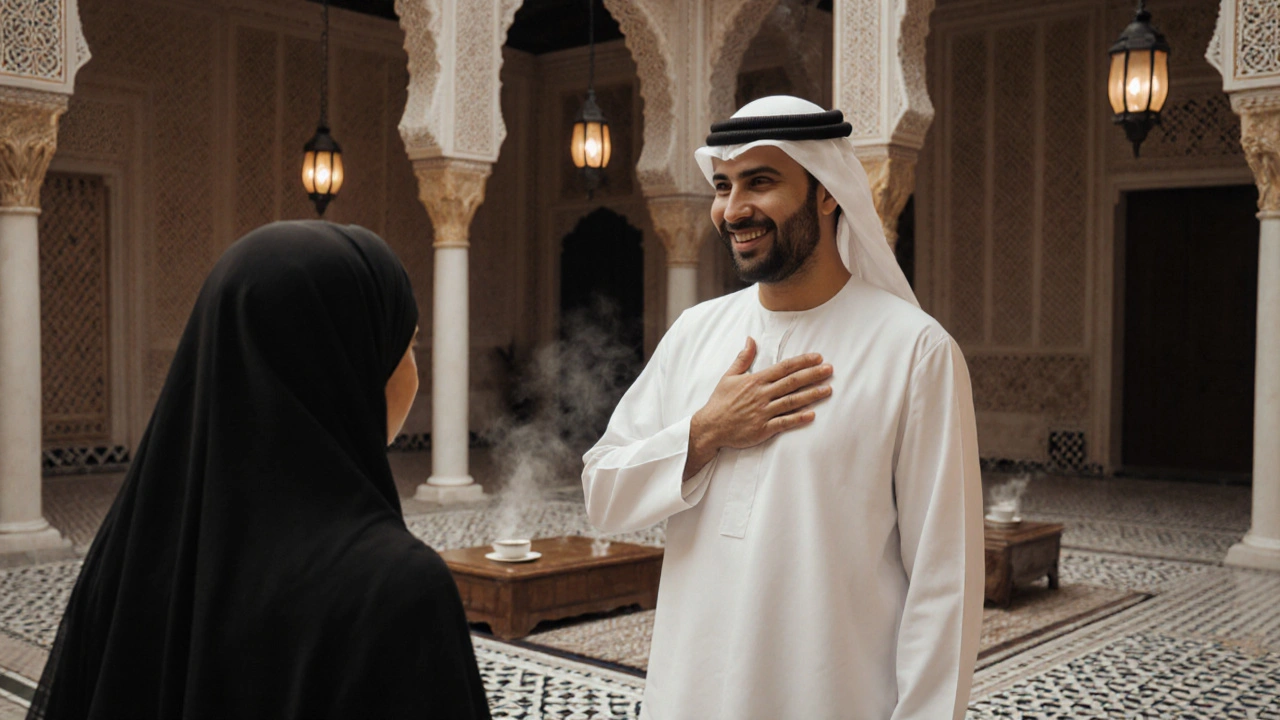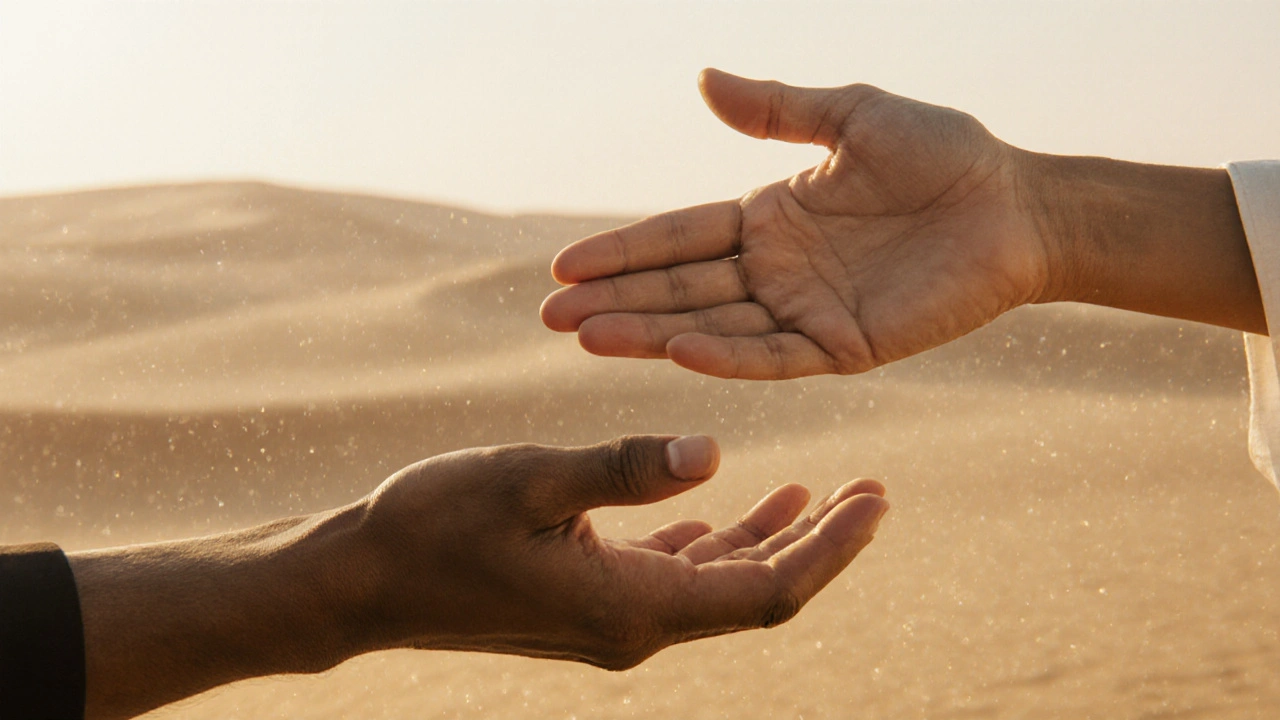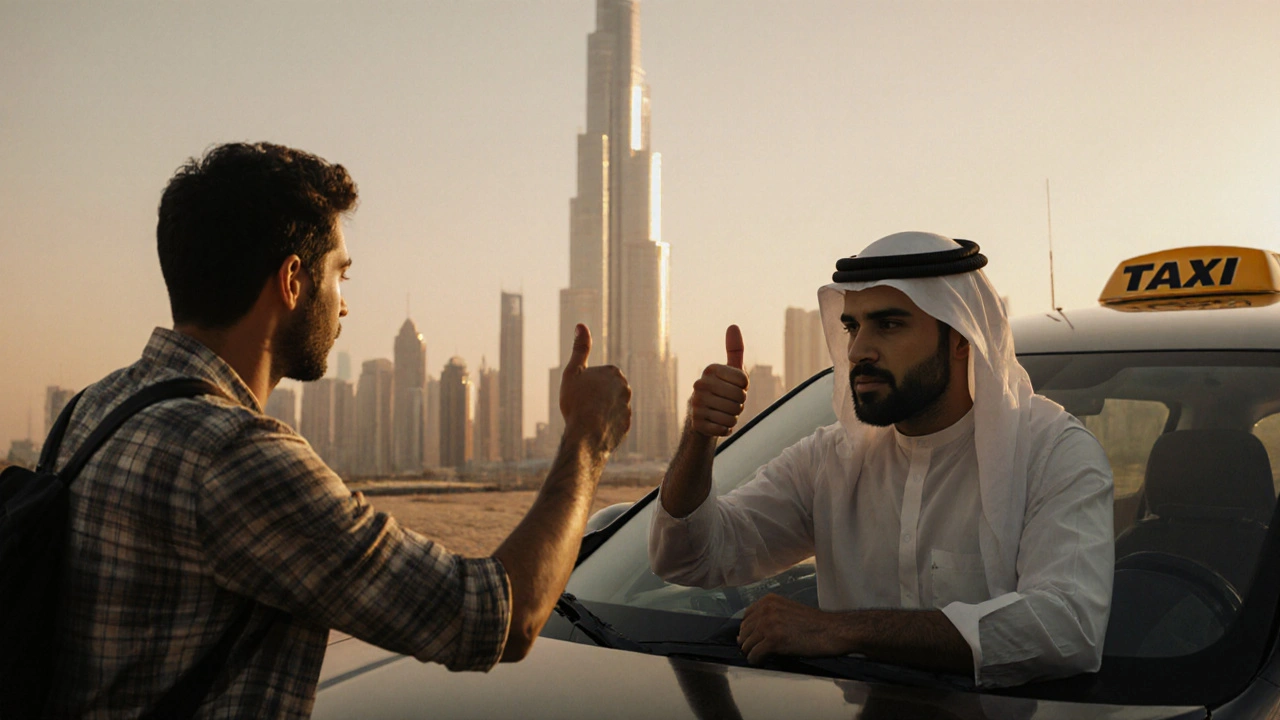People often ask if the thumbs-up gesture is rude in Dubai - and the answer isn’t simple. In New Zealand, where I’m from, it’s a casual cheer, a quick ‘good job,’ or a way to say ‘I’m okay’ while hitchhiking. But in Dubai, and across much of the Middle East, body language carries weight that words alone can’t carry. A thumbs-up might seem harmless, but in some contexts, it’s seen as deeply offensive - not because it’s meant to be, but because culture shapes meaning differently.
What Does the Thumbs-Up Gesture Mean in the Middle East?
The thumbs-up gesture isn’t universally positive. In countries like Iran, Iraq, Afghanistan, and parts of the Gulf, including the UAE, it’s considered a vulgar insult - roughly equivalent to flipping someone off in the West. It’s not about the thumb itself; it’s about the motion and historical context. The gesture traces back to ancient Arab traditions where raising the thumb upward mimicked the shape of a phallic symbol, making it crude and disrespectful in formal or public settings.
In Dubai, where conservative values blend with global tourism, locals and expats alike are aware of this. Tourists who give a casual thumbs-up to a taxi driver or a shopkeeper might not realize they’ve crossed a line. It’s not always intentional, but the reaction can be immediate: silence, averted eyes, or even a cold dismissal. You won’t get yelled at - Dubai is too polite for that - but you’ll feel the chill.
How Do Locals Actually Communicate Approval?
Dubai residents don’t rely on hand gestures to show approval. Instead, they use words, nods, or subtle facial expressions. A small smile, a slight head tilt, or saying “mashallah” (God has willed it) are common ways to express appreciation without risking offense. In business settings, a firm handshake and direct eye contact signal respect. In casual situations, a verbal “thank you” or “shukran” goes further than any hand signal.
Even in tourist-heavy areas like Dubai Marina or Downtown, you’ll notice locals avoiding exaggerated gestures. Emiratis tend to keep physical expressions restrained. That’s not because they’re cold - it’s because they value dignity and discretion. If you want to say “good job” to a waiter or thank a guide, say it out loud. Your tone matters more than your hand.
What Other Gestures Should You Avoid in Dubai?
Thumbs-up isn’t the only gesture that can cause trouble. Here’s what else to watch out for:
- Pointing with your finger - Considered aggressive. Use your whole hand instead.
- Showing the soles of your feet - Feet are seen as unclean. Don’t cross your legs in a way that exposes them to others, especially elders.
- Public displays of affection - Holding hands is okay for married couples, but kissing or hugging in public is illegal and can lead to fines or arrest.
- Using your left hand to eat or hand over items - The left hand is traditionally used for hygiene purposes. Always use your right hand when giving or receiving something.
- Waving or beckoning with your palm down - This gesture is used to call animals. To signal someone to come, use your palm up and fingers curling inward gently.
These aren’t just “rules” - they’re deeply rooted in Islamic and Bedouin traditions. Breaking them doesn’t make you a bad person; it just makes you unaware. And in a place like Dubai, where hospitality is sacred, awareness is the best form of respect.

When Is It Safe to Use a Thumbs-Up in Dubai?
There are exceptions. In highly international spaces - like luxury hotels, international airports, or expat-heavy coworking spaces - you might see foreigners using the gesture without backlash. Staff in these environments are trained to ignore cultural missteps from tourists. But even there, it’s risky. If you’re unsure, don’t do it.
The safest approach? Reserve thumbs-up for private moments with close friends who are familiar with Western norms. Even then, some Emiratis find it childish or crude. Better to say “well done” or nod with a smile. It’s more meaningful, and it shows you’ve made the effort to understand.
Why Does Dubai Care So Much About Gestures?
Dubai isn’t just a city - it’s a cultural bridge. It welcomes millions of tourists every year, but it doesn’t compromise its values to do so. The government invests heavily in cultural education for residents and visitors alike. Signs in airports remind tourists to dress modestly. Hotels hand out etiquette guides. Even ride-share apps like Careem have in-app tips about local customs.
This isn’t about control - it’s about preservation. Dubai wants to be global, but not Westernized. It’s proud of its identity. When you respect its norms, you’re not just avoiding trouble; you’re building trust. Locals notice when visitors make an effort. And that effort often leads to warmer interactions, better service, and invitations to experiences you’d never get as a tourist who just “does what they do at home.”

What Happens If You Accidentally Offend Someone?
Most of the time, nothing dramatic. Dubai is a tolerant city. If you say “I’m sorry, I didn’t know,” with sincerity, most people will smile and move on. But there are limits. In 2023, a tourist was fined AED 2,000 (about $545 USD) after giving a thumbs-up to a police officer during a routine check. The officer didn’t escalate - but the system did. That’s not punishment for rudeness; it’s enforcement of public decorum.
Don’t assume you’ll get away with it because you’re a foreigner. Dubai’s laws apply to everyone. And while the police won’t arrest you for a thumbs-up, they can record it, issue a warning, or flag you for future encounters. Better to avoid the risk entirely.
How to Navigate Cultural Differences Without Stress
You don’t need to memorize a 50-page guide to be respectful. Just follow these three simple rules:
- Observe first - Watch how locals interact. Copy their tone, posture, and gestures.
- When in doubt, say nothing - Silence is safer than a wrong gesture.
- Ask politely - If you’re unsure, say, “I want to be respectful - is this okay here?” Most people will appreciate the effort.
And remember: Dubai isn’t trying to trap you. It’s inviting you in. The more you adapt, the more you’ll see - not just the Burj Khalifa or the desert dunes, but the quiet smiles, the shared tea with strangers, the way people pause to let elders pass first. That’s the real Dubai.
Final Thought: Respect Is a Language Too
Language isn’t just words. It’s silence. It’s posture. It’s how you hold your hand. In Dubai, the thumbs-up might seem like a tiny thing - but it’s a symbol of whether you’re just passing through, or if you’re willing to meet the culture halfway. Choose the latter. You’ll get more in return than you ever expected.
Is giving a thumbs-up illegal in Dubai?
No, it’s not technically illegal, but it can be considered offensive and may lead to social discomfort or, in rare cases, official warnings. Public decency laws in Dubai cover behavior that disrupts social harmony, and gestures seen as vulgar fall under that category. While you won’t be arrested for a thumbs-up, you could be flagged by authorities if it’s directed at someone in a position of authority or in a public setting.
Can I use thumbs-up with my friends in Dubai?
If your friends are expats or Westerners who understand the gesture, they likely won’t mind. But if you’re with Emirati friends or locals, even in private, it’s safer to avoid it. Many Emiratis find the gesture crude, regardless of context. A simple nod or verbal praise like "mashallah" or "excellent" is always better received.
What should I say instead of a thumbs-up in Dubai?
Use words. Say "good job," "thank you," or "shukran" (Arabic for thank you). A warm smile or a slight nod of the head also works well. In formal situations, a handshake with your right hand is the most universally respected gesture. These are simple, clear, and culturally safe.
Are there other hand gestures I should avoid in Dubai?
Yes. Avoid pointing with a single finger, showing the soles of your feet, waving with your palm down, and using your left hand to hand over items. Also, don’t make the "OK" sign (thumb and index finger touching) - it’s offensive in several Middle Eastern countries. Stick to open-palm gestures and verbal communication to stay safe.
Do Dubai locals use any hand gestures at all?
Yes, but they’re subtle. A light touch on the chest to show sincerity, a raised eyebrow to express surprise, or a hand over the heart to show gratitude are common. These gestures are quiet and meaningful - they reflect the cultural value of dignity over drama. You’ll notice them more if you pay attention.
